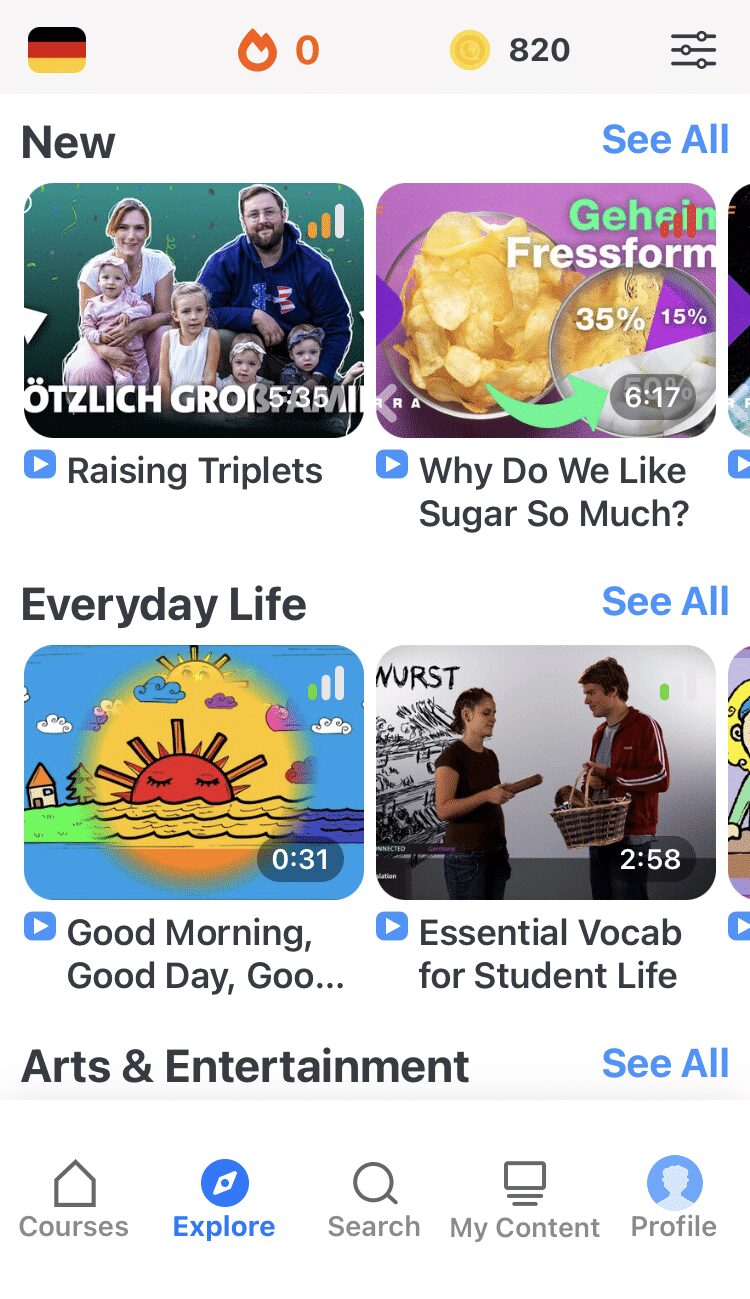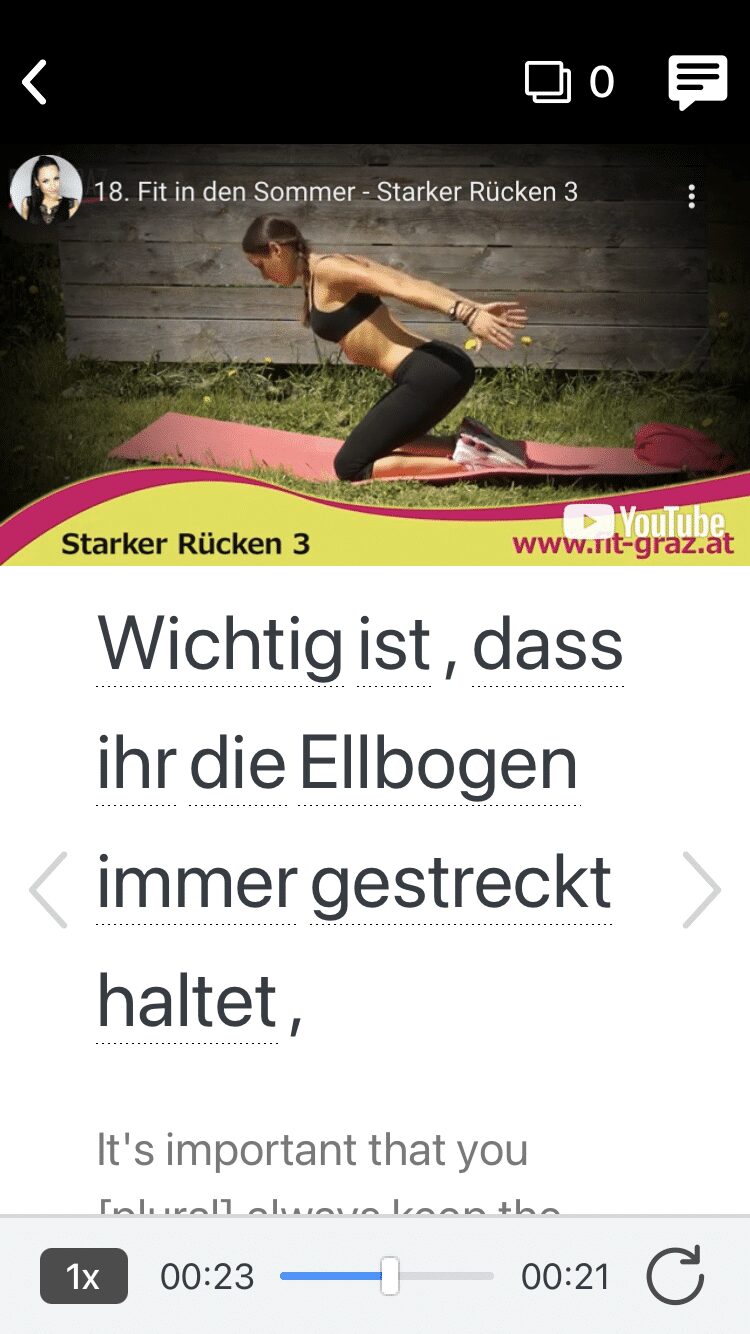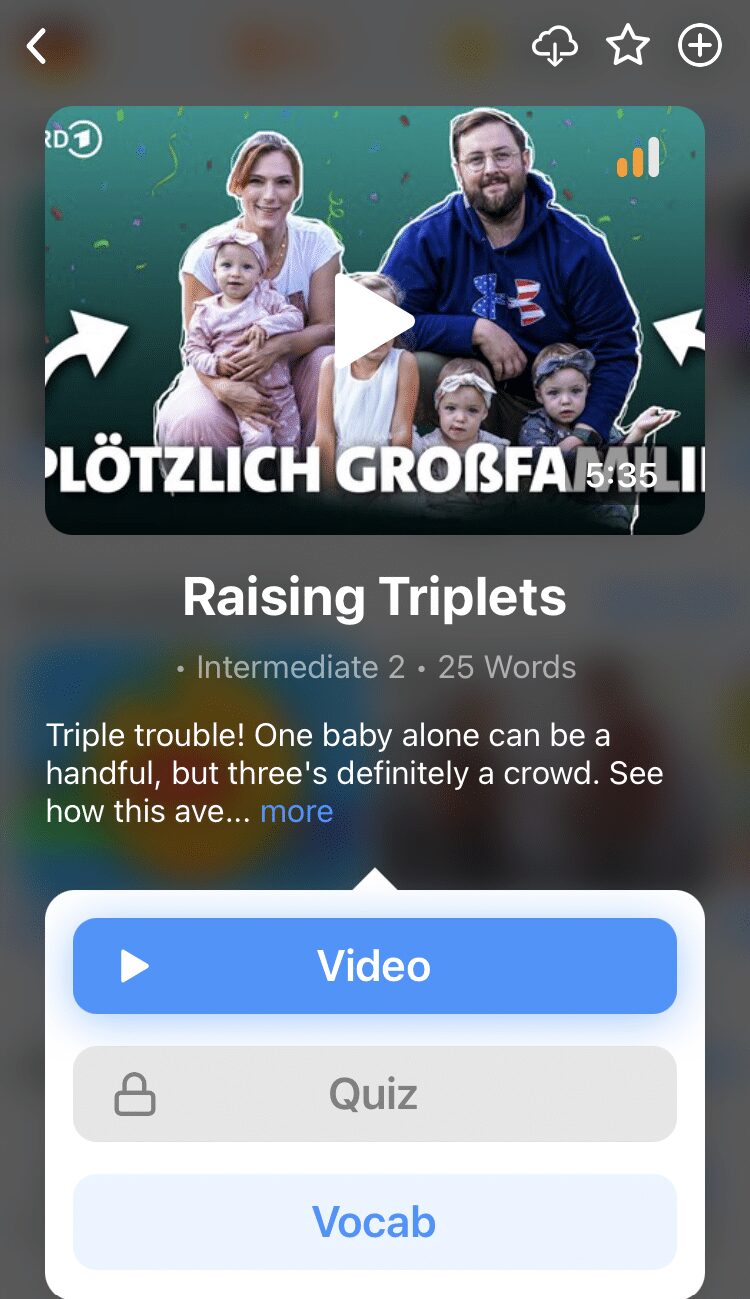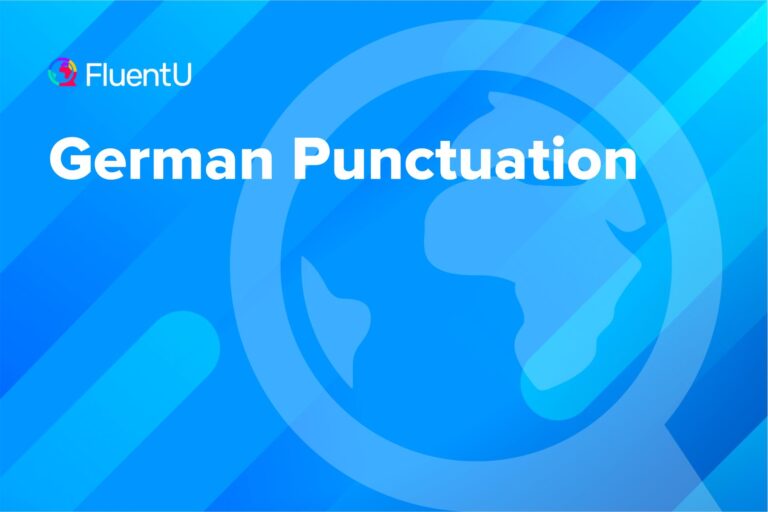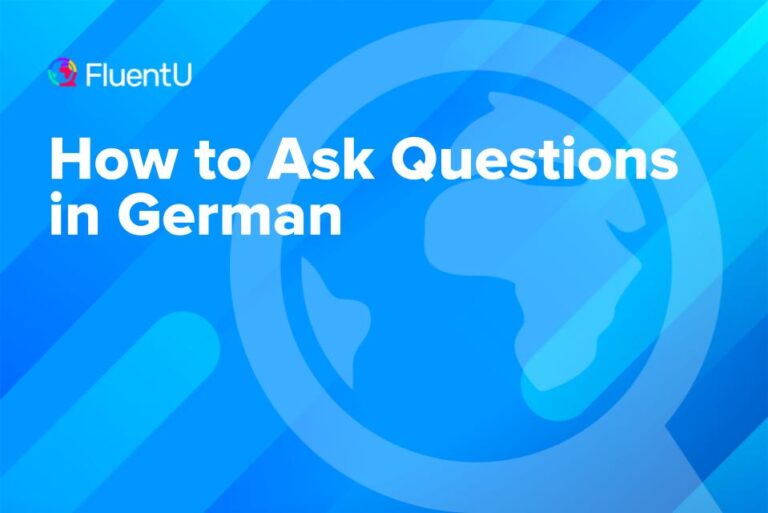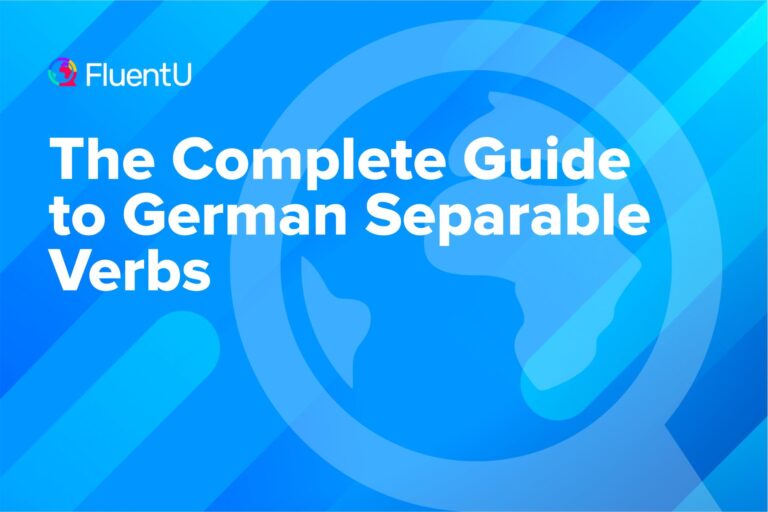German Tenses

For an English speaker, learning German tenses can feel like entering a parallel universe.
But don’t fret! Remember, English is a Germanic language. Despite their differences, these two languages are related on a deep and fundamental level.
Luckily for you, that means you can use your knowledge of English grammar to learn German grammar.
Download: This blog post is available as a convenient and portable PDF that you can take anywhere. Click here to get a copy. (Download)
The Present Tense
| Present Conjugation | English Translation |
| Ich spiele | I play |
| Du spielst | You play |
| Er/sie/es spielt | He/she/it plays |
| Wir spielen | We play |
| Ihr spielt | You play (plural) |
| Sie spielen | They/you (formal) play |
The simple present tense in German is much like the present tense in English. It’s constructed by adding on endings to the verb stem, and it refers to actions happening at the moment of speech.
But you can’t just pretend it’s the English present.
The biggest difference between the English simple present and the German simple present is that the German version covers the present progressive aspect as well. This is one of those situations where one German tense does the work of two English tenses.
In English, “I play guitar” and “I am playing guitar” are two different verb forms for different meanings. In German, the equivalent of the first can mean either of these things. Of course, if you add a time expression, the context makes it clear which is meant:
Ich trinke gerade eine Tasse Tee.
I’m drinking a cup of tea right now. — Present progressive
Jeden Morgen trinke ich eine Tasse Tee.
Every morning, I drink a cup of tea. — Present simple
Note how these verbs are conjugated exactly the same, but they mean different things.
So be sure not to try and translate the present progressive literally: “I am playing guitar” is never, “Ich bin Gitarre spielen”, but simply: Ich spiele Gitarre.
Irregular Uses for the German Present Tense
There are two more uses of the German present tense that are important to understand.
First, in many instances the present tense can be used to refer to the future. This happens when you add a time expression such as a day of the week, which we often do in English too:
Am Dienstag fahre ich nach Hause.
I’m travelling home on Tuesday.
Second, you can use the German present tense with the word seit (since), to talk about something that started in the past and is still going on. In this way, the German present tense can function like the English present perfect.
Ich kenne sie seit Jahren.
I’ve known her for years.
Notice how here, Ich kenne (I know) is in the present tense, but it corresponds to the English “I’ve known,” which is the present perfect. We don’t have anything exactly like this in English, so this is one of those moments where you’ll have to immerse yourself in German until you get used to it.
So, the German present tense covers many different English tenses. What happens when that gets reversed—when just one English tense corresponds to several in German? Let’s have a look at the past.
The Simple Past Tense
| Past Simple Conjugation | English Translation |
| Ich spielte | I played |
| Du spieltest | You played |
| Er/sie/es spielte | He/she/it played |
| Wir spielten | We played |
| Ihr spieltet | You (plural) played |
| Sie spielten | They/you (formal) played |
German has a simple past tense, and English has a simple past tense. They both have similar usages: talking about events that started and ended in the past.
Even their conjugations look similar. For example, regular English past tense verbs tend to be the infinitive form of the verb plus a “-d” or “-ed” ending. It’s similar in German, but the ending is usually -t or -te. For example:
Er malt (he paints) → Er malte (he painted).
There are also similarities when it comes to irregular verbs. English has a lot of verbs that change their vowels in the past tense. For example “run” becomes “ran.” Usually, when that happens in English, the cognate verb in German undergoes the same shift. “Run” fits that pattern:
Er rennt (he runs) → Er rannte (he ran).
When to Use the German Past Simple
The big twist is that the German simple past is mostly only used in written German. You’ll most often see it in newspapers or documents. It’s fallen out of favor in spoken German, even in formal situations. It’d sound very weird to speak using the simple past all the time.
There are a few exceptions to this, including some very common verbs that are used in simple past in spoken German. For example, denken (to think), haben (to have), sein (to be) and wollen (to want) are frequently used in the simple past.
Ich dachte, du wohnst in München.
I thought you lived in Munich.
Ich hatte gestern eine Prüfung.
I had an exam yesterday.
Ich war im Wohnzimmer.
I was in the living room.
Ich wollte an den Strand gehen.
I wanted to go to the beach.
The Present Perfect Tense
| Present Perfect Conjugation | English Translation |
| Ich habe gespielt | I played |
| Du hast gespielt | You played |
| Er/sie/es hat gespielt | He/she/it played |
| Wir haben gespielt | We played |
| Ihr habt gespielt | You (plural) played |
| Sie haben gespielt | They/you (formal) played |
Now, let’s turn to the past tense used most often in spoken German: the present perfect or the compound past.
In terms of construction, it’s like the English present perfect. It’s built by conjugating haben (to have) in the present tense as an auxiliary verb, and then adding the past participle of the actual verb. So, it looks similar to English constructions like “I have done” or “We have eaten.”
But take careful note—it doesn’t have the same meaning. The structure is the same as English, but the meaning can either be like the English simple past (I sang) or present perfect (I have sung), depending on the context.
Wir haben Fußball gespielt.
We watched a movie.
As you can see, the verb is made up of the auxiliary verb haben (have) and the past participle gespielt (played). But its meaning is closer to “they played,” rather than “they have played.”
One last note of complexity: when we’re dealing with the simple past, sometimes the auxiliary verb isn’t haben but sein. Verbs relating to motion or a change of state use sein. For example:
Ich bin in den Supermarkt gegangen.
I went to the grocery store.
As you can see, we conjugated sein to ich bin and then stuck the participle on the end of the sentence. As a reference, here is how you conjugate both haben (to have) and sein (to be):
| Haben Conjugation | English Translation | Sein Conjugation | English Translation | |
| ich habe | I have | ich bin | I am | |
| du hast | You have | du bist | You are | |
| er/sie/es hat | He/she/it has | er/sie/es ist | He/she/it is | |
| wir haben | We have | wir sind | We are | |
| ihr habt | You (plural) are | ihr seit | You (plural) are | |
| Sie/sie haben | They/you (formal) are | Sie/sie sind | They/you (formal) are |
Irregular Past Simple Verbs and Past Participles
When it comes to the past perfect, half the battle is learning the correct past participles. Whenever you see a word with ge—en or ge—t at the end of a sentence, you know it’s a past participle.
Both past simple verbs and past participles are sometimes irregular. That’s why most German dictionaries and textbooks give a verb’s infinitive, its simple past form and its part participle whenever introducing a new word.
It’s best to memorize all three at the same time. Here are a few common irregular ones:
| English Translation | Infinitive | Past Simple | Past Participle |
| to be | sein | war | gewesen |
| to have | haben | hatte | gehabt |
| to speak | sprechen | sprach | gesprochen |
| to go | gehen | ging | gegangen |
| to sit | sitzen | saß | gesessen |
| to do | tun | tat | getan |
| to eat | essen | aß | gegessen |
| to drink | trinken | trank | getrunken |
Since this tense is a bit different from English, it can be tricky for English speakers to learn. If you need some reinforcement, you can check out these self-tests—or, for slightly more intense training, this timed quiz from Sporcle.
The Past Perfect Tense
| Past Perfect Conjugation | English Translation |
| Ich hatte gespielt | I had played |
| Du hattest gespielt | You had played |
| Er/sie/es hatte gespielt | He/she/it had played |
| Wir hatten gespielt | We had played |
| Ihr hattet gespielt | You (plural) had played |
| Sie hatten gespielt | They/you (formal) had played |
The tenses discussed previously in this article were the most complex and the most divergent from English. From here on out, it’s easy street, as the tenses line up very well.
Let’s consider the past perfect, first in English. In English, we would say, “I had finished my homework before she called” or “They had already eaten when we arrived.” We say “had finished” or “had eaten” to show that the first action happened before the second action.
“Had” for us is in the past tense, and so we’ll do the same thing in German. Appropriately conjugate haben in the past tense and add the past participle. It’s very easy to pick up! Here’s an example:
Ich hatte den Film schon gesehen.
I had already seen the film.
And don’t forget, you need to use sein for verbs describing movement or a change of state. Here, you just do the same, you put the auxiliary verb sein into the simple past:
Als ich ankam, war sie bereits gegangen.
When I arrived, she had already gone.
When to Use the German Past Perfect
This tense isn’t used very much, but it does crop up fairly frequently in interviews. If you want to study it, go ahead and read some German newspapers or magazines where they interview famous people about their lives. You’ll see this tense left and right!
If you still aren’t sure about this tense, you can watch how native speakers use it in various video examples with FluentU.
FluentU takes authentic videos—like music videos, movie trailers, news and inspiring talks—and turns them into personalized language learning lessons.
You can try FluentU for free for 2 weeks. Check out the website or download the iOS app or Android app.
P.S. Click here to take advantage of our current sale! (Expires at the end of this month.)
By the way, if you’re still confused about the past tense versus the past perfect in English, you might benefit from brushing up on your English grammar—it’ll pay dividends for your German learning! You can check out a textbook like “English Grammar for Students of German,” which will teach you both at the same time.
The Future Tense
| Future Conjugation | English Translation |
| Ich werde spielen | I will play |
| Du wirst spielen | You will play |
| Er/sie/es wird spielen | He/she/it will play |
| Wir werden spielen | We will play |
| Ihr werdet spielen | You (plural) will play |
| Sie werden spielen | They/you (formal) will play |
We’ve left the future tense for last because it’s just that easy.
How do we make the future tense? Let’s use the example of: “I will never forget you”. Same as with English, we need a helping verb, “will” plus the infinitive “forget”. No new verb forms!
In German, the helping verb we need is actually werden (to become). So our previous sentence is:
Ich werde dich niemals vergessen.
I will never forget you.
As you’ve noticed, in German the helping verb stays in the regular place, while the next part gets kicked to the end of the sentence.
Be very careful here, because there’s a word spelled w-i-l-l in German that may trip you up which means “I want.” We can’t ever use will in the space for that helping verb! It’s always, always going to be some conjugation of werden.
As we mentioned before, you can often just use the present tense with a future time phrase to talk about your future plans. The proper future tense above is more often reserved for promises or intentions.
The Future Perfect Tense
| Future Perfect Conjugation | English Translation |
| Ich werde gespielt haben | I will have played |
| Du wirst gespielt haben | You will have played |
| Er/sie/es wird gespielt haben | He/she/it will have played |
| Wir werden gespielt haben | We will have played |
| Ihr werdet gespielt haben | You (plural) will have played |
| Sie werden gespielt haben | They/you (formal) will have played |
Last, we have the future perfect tense. Luckily for us English speakers, the future perfect is basically a one-to-one equivalent between English and German; you use it in the same situations in either language.
And consider yourself doubly lucky, because the future perfect tense is simply a combination of verb forms we’ve seen before.
To construct it, you’ll use the helping verb werden (to become) just like in the future simple. Then, tack on a conjugation of the past participle using either haben or sein. Put it all together and you’ll get an example like this:
Bis morgen werde ich das Buch gelesen haben.
I will have read the book by tomorrow.
As you can see, this sentence includes the compound past tense habe gelesen (have read) and the helping verb werden to mark the future.
The only tricky thing here is that you have to put the auxiliary verb into the infinitive and flip the auxiliary and the past participle. In this case, habe gelesen becomes gelesen haben. And there you have it: the future perfect!
Remember, if you speak English, you’re already well on you’re way to mastering German tenses. All it takes is a little practice.
Good luck!
Download: This blog post is available as a convenient and portable PDF that you can take anywhere. Click here to get a copy. (Download)
And One More Thing...
Want to know the key to learning German effectively?
It's using the right content and tools, like FluentU has to offer! Browse hundreds of videos, take endless quizzes and master the German language faster than you've ever imagine!
Watching a fun video, but having trouble understanding it? FluentU brings native videos within reach with interactive subtitles.
You can tap on any word to look it up instantly. Every definition has examples that have been written to help you understand how the word is used. If you see an interesting word you don't know, you can add it to a vocabulary list.
And FluentU isn't just for watching videos. It's a complete platform for learning. It's designed to effectively teach you all the vocabulary from any video. Swipe left or right to see more examples of the word you're on.
The best part is that FluentU keeps track of the vocabulary that you're learning, and gives you extra practice with difficult words. It'll even remind you when it’s time to review what you’ve learned.
Start using the FluentU website on your computer or tablet or, better yet, download the FluentU app from the iTunes or Google Play store. Click here to take advantage of our current sale! (Expires at the end of this month.)

